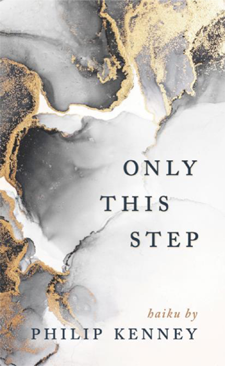New book by Philip KenneyOnly This Step |
|
Available for pre-publication sales at this time from Finishing Line Press |

Philip Kenney is a practicing psychotherapist in Portland, Oregon. He did his post-graduate work in British Object Relations at the Washington D.C. School of Psychiatry and has taught Self Psychology as part of his private practice. A long time meditator and poet, Mr. Kenney is the author of the novel, Radiance, and a collection of poetry, Where Roses Bloom. He strives to bring together the worlds of psychology, creativity and spirituality in his work and is the author of a new book on those subjects entitled, The Writer's Crucible: Meditations on Emotion, Being and Creativity.
The Writer
For the past seventeen years I have made my home in Portland, Oregon.† I live with my wife and two boys in an old Portland bungalow with our dog and three cats.† Did I mention the California Banana King Snake?† I am a practicing psychotherapist and find my work tremendously satisfying.† As a long-time meditator, I value the practice of meditation and the inclusion of spirituality into therapy.
Some twenty years ago, in the midst of a moderate bout with depression, I began an experiment with Prozac. Partly out of professional curiosity and partly out of desperation, I grasped for the little pill taking the country by storm. Eight weeks into the experiment I abandoned the project feeling slightly worse for the effort. That is, a bland lifelessness had replaced what we call depression and it was obvious to me that I preferred my old companion, melancholia, to the antiseptic normalcy of the Prozac cure.
The next two weeks were amongst the most miserable of my life, before or since. Depression of a far more despairing nature occupied my psyche and seemed like a squatter that would not be evicted. On the 18th day post-Prozac, I woke to a beautiful Oregon morning with anxiety pulsing through my being. Before I could do much of anything to combat it, I noticed something else was tagging along: a poem.
So taken was I with the vividness of the poem, I decided to write it down, even though I was never one to write except out of necessity. It was a beautifully terrible poem. I wrote another the next morning and (as dear old William Stafford practiced and advised) every morning thereafter for the next ten years. Four books, including Hours of Blue and Hymns for the Speechless, came from my pen in those early hours. One poem made it into a documentary film on the Yuba River in California. The others rest peacefully on the bookshelf, safe from the critical glare of poets and publishers.
Years later, on the eve of my 60th birthday, I wrote a list of the things I thought I could not and would not do. At the top of the list was playing the piano. I was right. My left hand seems barely connected to my neurology. Second on the list was writing a novel. I was certain I possessed no talent at writing dialogue and insufficient talent to pull it off otherwise. Certainly I was doomed to writing poems that only my wife and a few friends read and enjoyed.
I can say, without equivocation, that much of Radiance felt inspired and written from a place within that I cannot locate. Much of the book came unbidden, often at 2 or 3 AM, when I would awaken to entire phrases and whole paragraphs dancing in my head.† The novel was completed in seven months.† Most of that time my wife was quite ill with a mysterious disease that left her bedridden for eight weeks.† This did not deter the writing, which went on despite my fatigue and worry.
I donít fully understand what happened those months of writing Radiance, and frankly, I donít care if it remains a mystery. But what I can tell you is that the initial body of Radiance came out with little effort, further convincing me of a source within that is fresh and fertile.
The Psychotherapist
Doing psychotherapy is like reading Shakespeare. The comedies, tragedies, and histories make up every hour of intimate contact that is the psychotherapy session. This is such a unique relationship. Words are terribly inadequate to describe the subtleties and complexities of what takes place when two people come together for the purpose of exploring the mind and understanding each other in the moment.
I canít tell you how privileged I feel to know the people who come to work and better their lives. Many friends and neighbors feel sorry for me. They think it must be awfully hard to listen to peopleís problems all day. But truly, people are more like poems than problems. Listening to the varying expressions of so many individuals is to be welcomed into the mysterious movements of the psyche in its remarkable search for wholeness.
After more than thirty years of practicing therapy, I have come to believe that the psychological and the spiritual are not two. In my practice I hope to help others understand this and experience even their darkest and most painful moments as expressions of the dynamic motion of spirit doing its best to awaken and find its source in the deepest self.
This is not a simple or a brief process. Nor is it one with a conventional moment of completion. It is, however, a radical and honest approach to the self and to living that can open the door to being and self-acceptance in an entirely new way.
In my work, I often stumble and grope. Confusion often rules the moment. The notion of an expert and a patient is rejected. Together, through laughter and tears, we try to make sense of a life and realize the beauty of the human heart beating within.
